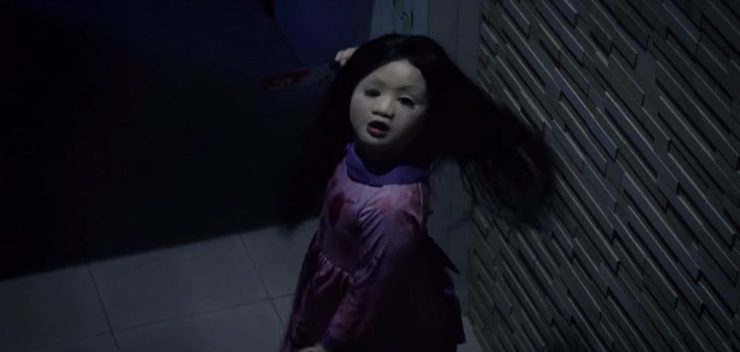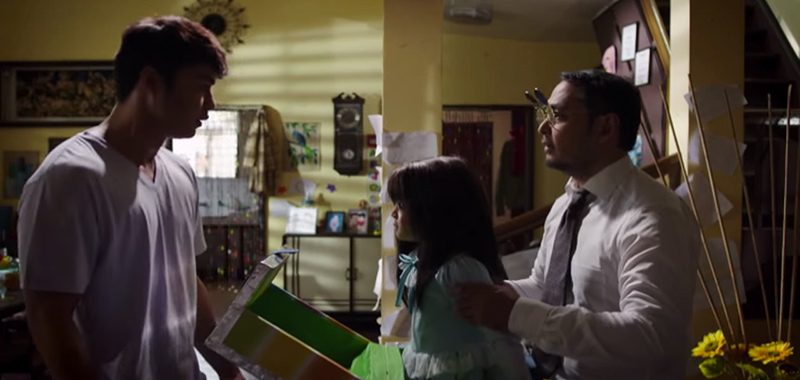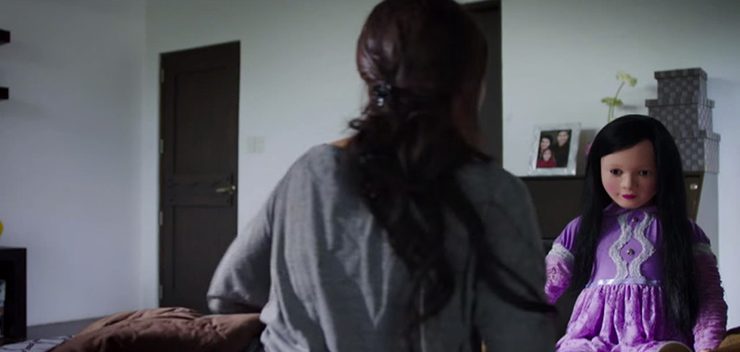SUMMARY
This is AI generated summarization, which may have errors. For context, always refer to the full article.

First, a note on another doll similarly named “Maria Leonora Theresa.”
Back in the day, the ‘love team’ of Nora Aunor and Tirso Cruz III also featured a doll named Maria Leonora Theresa, given to Nora by Tirso. The expressionless doll would grace the photographs of its adoptive parents, thrilling fans who have followed their idols’ love story.
Of course, it is all very silly. The doll, with all due respect to whatever emotions are behind the gifting of the doll to Aunor, is nothing more than a ploy to ease expectations from the famous couple. There simply needed to be another step to the saga of the box office love team.

It is this exact silliness that pervades Wenn Deramas’ Maria Leonora Teresa, which has absolutely nothing to do with Aunor and Cruz’s beloved doll.
In the movie, three dolls were adopted by parents (played by Iza Calzado, Jodi Sta. Maria and Zanjoe Marudo), to ease the pain of losing their daughters, obviously named Maria, Leonora and Teresa, to a bus accident. As it turns out, the dolls have murderous intentions, fueled by revenge.
Outside Deramas’ Comfort Zone

Deramas, who has fostered a career crafting frivolous comedies that seem overly reliant on pop culture references, finally steps out of his comfort zone. Maria Leonora Teresa is perhaps his most restrained film.
Absent the crutch of cheaply earned humor, Deramas is forced to be more ambitious and inventive. He crafts scenes which are far from original but showcase a potential for him to stick to the genre.
Horror, like comedy, requires a certain wit. It is not enough to shock and startle, although a lot of local contemporary horror films prefer this technique to temporarily please.
The film has to disturb by displaying a human trait molded into something grotesque. Deramas, as can be observed from his many comedies, has explored a full spectrum of normal human traits gone absurdly awry. It all looks like nonsense, but there seems to be something more to Deramas’ corny madness.
In his Tanging Ina series (2003-2010), he created a character whose various unrealistic adventures display an outwardly admirable but inherently dangerous obsession to motherhood. In Sisterakas (2012), siblings are forced to crime and violence by their abnormal competitive streak.
In This Guy’s in Love With U, Mare! (2012), a gay man who is obsessing over his former fling pretends to be straight to salvage a concluded relationship.
Horror in grief
Maria Leonora Teresa has grief in the spotlight. Deramas aptly exaggerates grief, with leads Calzado, Sta. Maria and Marudo taking turns bawling and wailing to emphasize the terrible loss their characters have experienced.
There is certainly a tinge of lunacy, enough to at least make their decisions to adopt the creepy dolls somewhat believable. In a way, Maria Leonora Teresa is no different from Deramas’ previous efforts, where he deals with crazed characters in equally crazy situations.
That said, Maria Leonora Teresa achieves the exact satisfaction as Deramas’ comedies. Aside from the erstwhile shocks and chills that are part and parcel of mainstream horror, the film is also laced with indispensable humor. The film’s design, from the dolls’ ludicrous looks to the hyperbolic scripting, seems to point to a direction that does not beg for serious consideration.

It is all inflated entertainment, although albeit more brutal and impish than the traditional fare. Deramas does repeat himself here, proving that despite the infamy he has achieved for himself because of his inane blockbusters, there is some sort of consistency in his creative output.
Queer interest
Specifically, Marudo’s character, a homosexual teacher who somewhat becomes the film’s primary hero, seems to be a reiteration of the flawed but strong gay men that populate his films. More intriguing is how Deramas, utilizing his status as a director who can rake in millions for his studio, can freely depict gay characters without even hinting of sensationalizing their status and situation.
Deramas has done his part to push gay cinema into the mainstream, for better or worse. His films have inconsistent politics and ideologies, perhaps because there are forces beyond his control. However, if only for the fact that he was able to deftly introduce a gay character in a horror film that does not require the tackling of gay politics, Deramas deserves some semblance of recognition.
Maria Leonora Teresa is your standard horror film. It is sometimes funny, sometimes scary, but never uninteresting. The film, however, seems to be more compelling if seen along with Deramas’ other features. It proves that the director who has been much-maligned because of his status is the representative of everything wrong in the film business is on to something. Or I may just be imagining things. – Rappler.com

Francis Joseph Cruz litigates for a living and writes about cinema for fun. The first Filipino movie he saw in the theaters was Carlo J. Caparas’ ‘Tirad Pass.’ Since then, he’s been on a mission to find better memories with Philippine cinema.
Add a comment
How does this make you feel?





There are no comments yet. Add your comment to start the conversation.